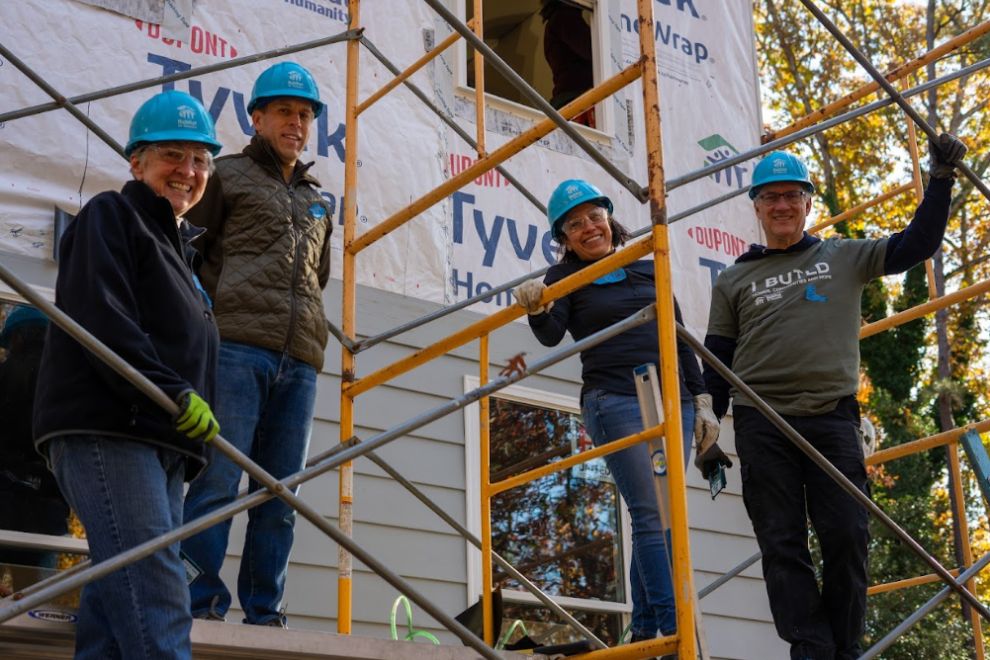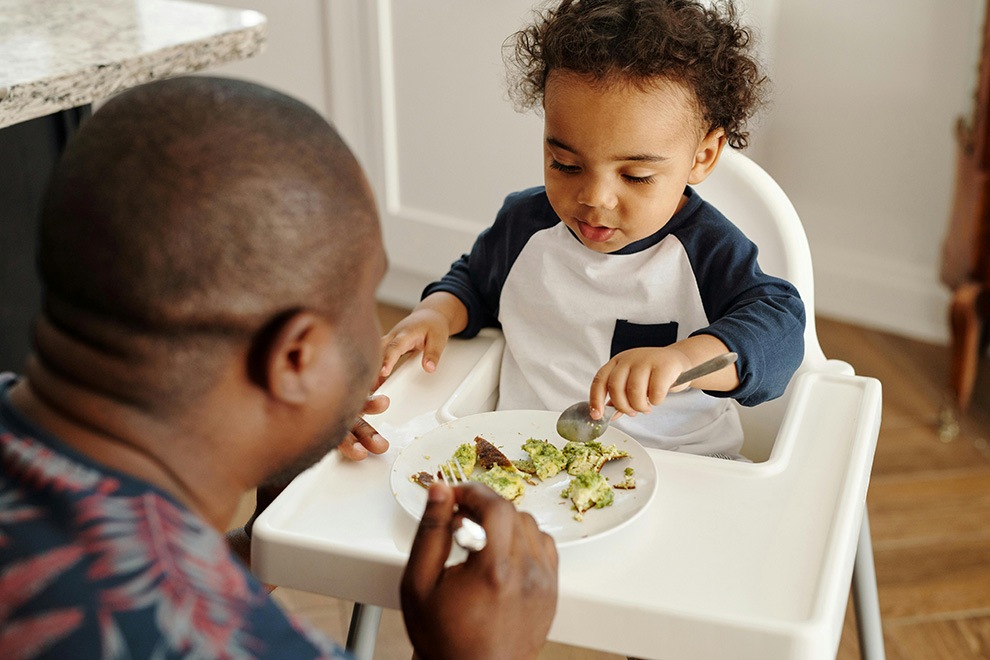Alexis Bodrick is accustomed to having classmates and friends come to her with their problems.
“It was usually a rant about something that had already happened, not [something] immediate,” the 2021 Manchester High School graduate says. “People just needed to air it out.”
As a member of Chesterfield County’s Youth Citizen Board, Bodrick was happy with the group’s focus for the 2020-21 school year: a social media campaign centered on teen mental health.
“We wanted to make a campaign not about awareness, but to give teens the tools they need to help themselves,” Bodrick says.
Posts on the board and county social media channels – Facebook, Twitter, and Instagram – included tips to relieve stress and manage at-home schooling, as well as contacts for local resources. More than forty thousand people accessed the posts, data shows.
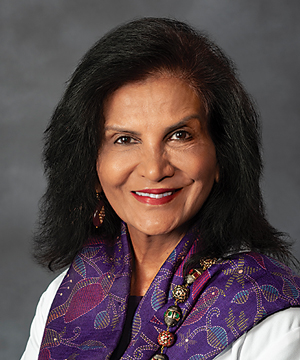
Bodrick says the campaign’s timing was perfect, given the social upheaval after the May 2020 killing of George Floyd and the mental and emotional toll of the COVID-19 pandemic.
“The pandemic was a good time to bring up mental health because everyone’s going through it,” she says. “You’re always going to have some stress, but you can alleviate that stress by letting people know it’s okay to not feel okay. We wanted to give kids knowledge that they have small amounts of control and help parents learn how to talk to their teens about this stuff.”
Bodrick points to the transitions that teens experience as the driving factors in challenges to mental health. “In middle school, we’re awkward, trying to find ourselves and find out who we are. We have developing bodies and maybe LGBTQ+ identification,” she notes. “For older teens, it’s about picking out a college or finding out what you’re going to do after high school. For most of our lives, what we’re given is awareness – these are the symptoms [of depression] – but we’re not given in-depth tools. We need the tools to fix that something. We want kids to understand they have the power to change the way they feel.”
Blueprint for Parents
For parents, the ultimate challenge is determining the difference between normal and severe upheaval during adolescence, observes Bela Sood, MD, a psychiatrist at Children’s Hospital of Richmond at VCU and a senior professor for child and mental health policy in the Department of Psychiatry at VCU School of Medicine.
“The teen years are about disconnecting from parents and connecting with new friends and experiences,” Dr. Sood says.
In adolescence, the brain is developing at a rapid pace, with rapid nerve growth and myelination – the surrounding of nerves in a fatty and protein tissue called myelin. “The brain is under construction,” Dr. Sood says. “The emotional brain – the amygdala – is rapidly maturing, but the central cortex, which sits on the brain like the rider of a horse, isn’t mature.”
The combination of a developing brain and surging hormones can create a storm of emotion and behaviors in a young person.

“All of that makes teens vulnerable to immediacy of thinking and acting,” Dr. Sood says. “It is beautiful because if you didn’t have that, your world wouldn’t be expanding. If you don’t move out of your comfort zone, you don’t discover things, you don’t learn things, but you make mistakes.”
Adolescence Is Unpredictable
Dr. Sood notes that, as with other developmental phases, the adolescent years are hardly uniform. Roughly one-third of the teenage population has a tumultuous adolescence, she says, in which “everything is upside-down, [they are] very oppositional and very acutely aware of their own body, not liking what they see, and reacting by getting depressed.”
Additionally, she says, about half of all mental health problems are present by the time a person turns fourteen, which means the teen years are even more critical. “It’s a good opportunity for prevention,” she says. “If you have a person wired to be anxious – we see that as separation or social anxiety in younger kids – these become more pronounced during adolescence. You have to differentiate between what is problematic and what is manageable.”
Dr. Sood says it’s important for parents to help children become the best versions of themselves. “You want the parent to be in sync with the child,” she says. “Don’t push an introvert to be an extrovert; you have to respect the child’s temperament and support it. You don’t want to communicate that the child isn’t good enough or lead the child to believe they are incompetent and not living up to what the parents want.”
Because it’s typical for adolescents to withdraw from parents during the teen years, Dr. Sood says loved ones need to pay attention to a variety of signs before concluding the teen is seriously depressed.
“They don’t want to even look at you, but they’re fine with other adults – that’s normal adolescence,” she says. “They’re trying to figure out ‘mine’ and ‘not mine,’ and they have to make a choice to reject [parents] in order to make room for new people in their lives.
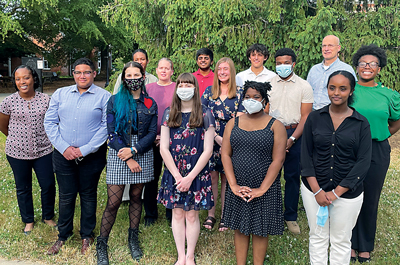
“You have to be a sleuth with their teachers and other kids. Are they happy elsewhere, progressing academically, and engaged with athletics or extracurriculars?” she says. “When your child becomes not only moody but disappears into his room, sleeps a lot, and eats too much or not enough, when your child avoids the outside world, then you need to be concerned about that.”
Dr. Sood adds that an awareness of family history is useful. “Many problems are heritable,” she says. “We see that with ADHD, depression, and bipolar disorder. Family studies look at the history of parents or parents’ siblings.” Mental health challenges among family members can put teens at a greater risk, but Dr. Sood says that if a parent has depression, it does not automatically mean a teen will, too.
The Pandemic’s Toll on Mental Wellness
The pandemic was an especially hard blow for teens, Dr. Sood notes. “It was a very specific stressor which completely extinguished interaction with peers, a critical aspect of social development,” she says. “The isolation was devastating for teens.”
Allie Longworth, MS, MT-BC, agrees the pandemic presents unique challenges for teens.
“They’re so dependent on socializing with friends, and they’ve been isolated,” she says. “With many parents overwhelmed with keeping work afloat, even if they were working at home, they’re often not as present as they’d like to be.”
Longworth, a clinician and music therapist with LaunchPad Counseling in Richmond, says the pandemic initially seemed to help certain students.
“Some kids, especially those who might be on the autism spectrum, got a huge break,” she says. “They could turn their camera off – they didn’t have to socialize. Ultimately, it hasn’t been that helpful, because [those students] do have to go back into the world, and they’re not getting the practice they need and the support they need, in some cases.”
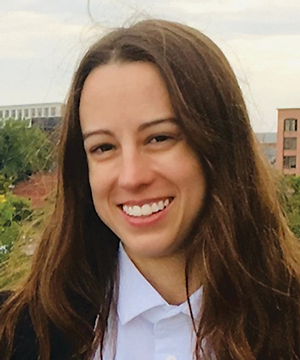
In other situations, the pandemic revealed what had been hidden. “Teens who were flying under the radar surfaced,” she says. “They had an increase in depression or anxiety that meant they finally got the help they needed.”
Longworth says parents should be aware of their teens’ mental and emotional health.
“Everyone is an individual,” she says. “We don’t know what stresses [our particular teen]; just because your kid isn’t talking to you doesn’t mean you’re doing something wrong. Stay curious and ask, ‘How is that going for you?’ Just listen to them, and don’t listen to fix. Having that mindset helps [teens] feel they have the space to share.”
Recognize and Validate Emotions
It’s essential for everyone, no matter their age, to recognize, identify, and name their emotions, Longworth says. “We do not grow up in a world that helps us deal with emotions in a healthy way. We’re surrounded by avoidance and distractions, but ultimately, we have to learn to deal with [the emotion].”
Longworth recommends “name it to tame it,” an approach from neuropsychiatrist and author Daniel J. Siegel. The strategy begins with young children, helping them understand what they feel and how to respond when they experience big emotions. Naming the emotion can create space and take some of the power out of it, she says. With teens, parents can use the strategy as a reset button.
“You can say, ‘I see you’re really angry; what do you need right now?’” she suggests. “Teens might know you’re speaking that [parenting] language, but it’s helping them learn. You’re planting a seed.” According to Longworth, the goal is for teens to be able to ask themselves what they need and then respond in a mentally healthy way.
Longworth often incorporates music into her therapy sessions, because research has shown that the physical body holds on to trauma, which includes anxiety. Talk therapy may not be enough to resolve the issue. “Music has a way of opening people up; it expresses something they wouldn’t say or couldn’t say,” she says.
Another option is medication, which Longworth can’t prescribe. “I’m not a psychiatrist, so I don’t fully make that decision,” she says. “But when [a client] is so overwhelmed that I’m concerned we can’t do the work we really need to do, I suggest exploring it.”

But, Longworth says, medication shouldn’t be regarded as either a cure-all or a lifetime commitment.
“If you’re on medication, there’s probably something you need to be working on; it’s not supposed to be its own treatment,” she says. “It’s not supposed to be forever, and it might actually shorten treatment, because it’s what’s needed right now, to get [the client] through this time. It’s a tool that can help.”
Longworth also encourages parents to choose their words carefully. “[Children] will internalize what their parents say,” she notes. “When you speak to your child, think, ‘Is this the voice I want them to hear in their head?’”
It can be difficult for parents to separate themselves from their kids, “but your child is their own person,” she adds. “The best thing you can do is trust them. They really need unconditional acceptance and to know they are loved for who they are.”
Making Connections in the Community
The Henrico County-based Cameron K. Gallagher Foundation (CKG), founded in 2014 to raise awareness and provide education about teen mental health, offers a variety of resources to support teens and parents. The foundation’s digital toolkits are often presented by a facilitator in a school setting, but also can be requested by families. Additionally, the foundation supports teen-led SpeakUp Clubs, which are designed to spark conversations in safe, peer-led settings. During the pandemic, the foundation added Conversations with CKG, free monthly online presentations led by experts on topics like screen addiction and body image.
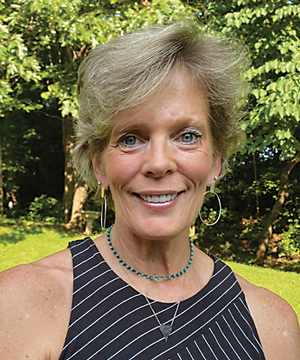
“Anxiety shouldn’t be stigmatized,” says CKG’s Clair Norman. “Anxiety needs to be confronted and navigated with skill. We hope to teach middle and high schoolers some awareness of how stress shows up for them in their own body, in their own mindset, and in their own behaviors.”
Norman says the foundation’s goal is to normalize conversations that have been avoided by many families.
“All of us have mental health; all of us have anxiety,” she says. “CKG is a mainstream organization that brings these conversations out of silos and out of corners. We set the tone through education and acceptance for tending to your own mental health.”
The Journey to Mental Health
According to the U.S. Centers for Disease Control, 74.9 percent of the population aged eighteen to twenty-four struggles with a mental health problem. Many in that age group live primarily on a college campus.
“Most news articles focus on ‘fragile college students’ and an epidemic of anxiety, but we’ve been telling [students] for decades it’s okay to need help with mental health,” says Peter LeViness, PhD, director of Counseling and Psychological Services (CAPS) at the University of Richmond. “People are taking us up on that. Lots of students feel incredibly comfortable doing that.”
Dr. LeViness says research indicates the increased demand for student mental health services on college campuses is related to reduced stigma, not an explosion of disorders, noting that when he was in college, “I met zero people who said they had gone to counseling. Now, kids talk about it, recommend it to their friends. There’s something really positive about that.”
To continue to meet student needs during the pandemic, UR’s CAPS program was able to use their established software system, which included a secure videoconferencing feature. “We thought, ‘We’ll never need that,’” Dr. LeViness says. “Then, COVID hit, and we got it up and running very quickly.”
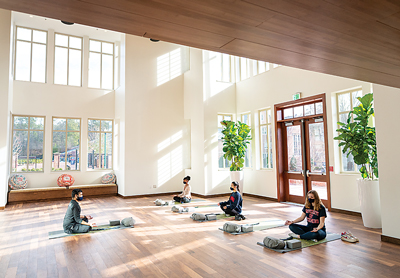
But Dr. LeViness warns that college counseling services aren’t set up to provide long-term treatment, especially for a serious pre-existing issue. “I always worry about students who are in a precarious place and then go to college,” he says. “Even with a college you’re excited about, it’s a big transition and very stressful. If [a student] is struggling a month before college, you may want to delay [enrollment]; it can make things worse.”
On-campus counseling is useful for a crisis and shorter-term needs, Dr. LeViness says, “but we’re not designed to be treatment facilities. We want to offer reasonable supports, and we can help people find connections locally for regular help.”
Counseling staff also remind students of the basics: sleep, physical activity, and nutrition.
“It’s amazing how much they can help us buffer some of [life’s] stresses,” Dr. LeViness says. “Some studies show regular physical activity can act as treatment for anxiety, and it certainly helps with stress. We encourage students to find a sustainable pattern or lifestyle, because if you start those habits [young], you’re more likely to keep doing it.”

photos : Courtesy University of Richmond, Cameron K. Gallagher Foundation, Chesterfield County Communications and Media
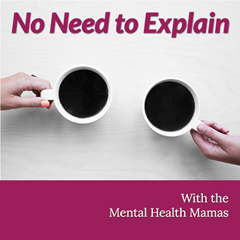 Podcast by Parents, for Parents
Podcast by Parents, for Parents
The Mental Health Mamas – aka Tina Hallock and Serena Ward – are sharing the message that when children hurt, so do their parents. And it’s okay to talk about it.
They do just that, every week, in their podcast “No Need to Explain,” which focuses on the challenges parents face as they raise children who struggle with their emotional or mental health.
Hallock and Ward met six years ago as family support specialists at an upstate New York nonprofit. Together, they led book discussions for parents that often included personal sharing of different families’ experiences. They launched “No Need to Explain” in November 2020 and plan to continue following Hallock’s move to Richmond with her husband, Kevin, who took over as the University of Richmond’s president in August.
“I remember when my 23-year-old was little, and we lived [elsewhere], and I literally felt completely alone,” Ward says. “I really had no idea there were other people out there who might be struggling to parent a child, that it’s not so easy.”
Hallock adds, “The normalizing was so amazing to me – that other people have these similar experiences. It’s certainly reduced my isolation, knowing that others are maybe not in the same boat, but in the same storm.”
Prepandemic, the pair planned to write a book, but the podcast “seemed like the thing that people needed more right now,” Ward says.
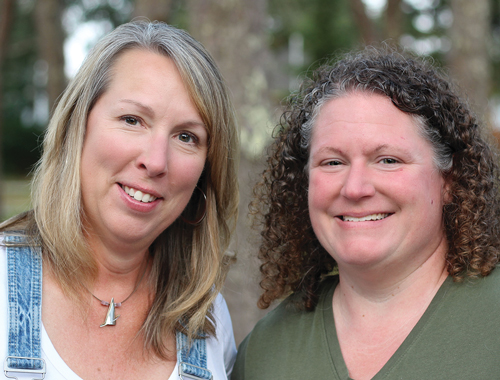
Ward is mom to three children – ages nineteen, twelve, and six – while Hallock has two adult children, ages twenty-three and twenty-seven. Their offspring are supportive of the effort, both say.
“My kids have grown up in this atmosphere of trying to normalize the conversation” around mental wellness, Ward says, noting that her oldest has become a good self-advocate and an advocate for others. Hallock says her older child is fine with the podcast, but doesn’t listen, because “she has said she doesn’t need to relive that stuff.” Hallock’s younger child participated in an episode about first responder mental health, because he is now a firefighter.
Both Hallock and Ward note that they might talk in general about their own family experiences, but the point of the podcast is to speak to parents who need help. “We don’t view ourselves as parent educators, but there is an element of sharing information,” Ward says. “It’s about being able to share that with other people so there isn’t somebody out there who says, ‘Gosh, I didn’t know that kids could have mental illness or struggle with their mental health.’”
Hallock says the more comfortable she became telling people about her family’s challenges, the more others opened up about theirs. “I’m never going to shut up. It will be part of the conversation because it is part of every conversation.”
You can find and listen to “No Need to Explain with the Mental Health Mamas” on Spotify, Apple Podcast, PodBean, and wherever you download podcasts.




